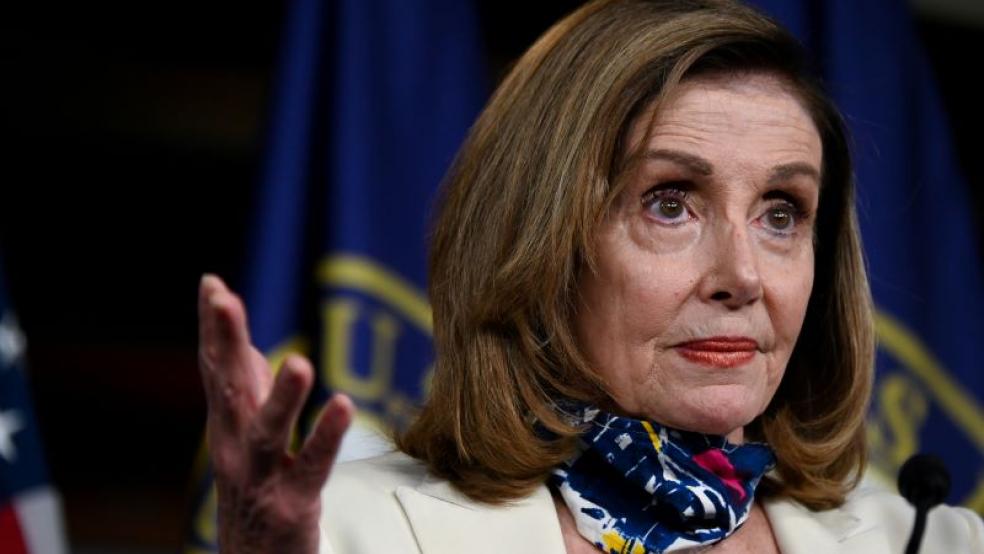Echoing President Joe Biden’s suggestion at a press conference Wednesday that Democrats’ Build Back Better bill may need to be reduced in size and scope if it’s going to have any hope of moving forward, House Speaker Nancy Pelosi (D-CA) said Thursday that in her view the spending plan needs to be slimmed down and perhaps even renamed.
While quibbling with Biden’s assessment that the bill may need to be broken into “big chunks” that can pass separately, Pelosi agreed that the effort needs to be smaller overall. “So what the president calls ‘chunks’ I would hope would be a major bill going forward,” Pelosi told reporters. “It may be more limited, but it is still significant.”
Pelosi said the idea that the bill can be broken down and passed piece by piece doesn’t make sense, since Democrats still have limited options for passing legislation in a closely divided Congress. “This is a reconciliation bill,” she said, referring to the legislative vehicle that would allow Democrats to evade a filibuster in the Senate. “So when people say, ‘let's divide it up,’ they don't understand the process.”
What does Manchin want? Many Democrats believe the only way forward is to craft a bill that Sen. Joe Manchin (D-WV) is willing to accept. But trimming the existing bill may be a more difficult process than it first appears.
Manchin has indicated that the roughly $1.8 trillion package he offered to the White House last month is no longer on the table, and on Thursday he said Democrats would need to start “from scratch” rather than revise the existing bill. “We're going to start with a clean sheet of paper and start over,” Manchin said, noting that no talks are currently scheduled on the issue. “If anybody wants to talk, I'll always talk,” he added. Asked what comes next, he said, “I can't tell you.”
Manchin also made it clear that he is still worried about the effect the Democratic spending plan could have on the inflationary pressure still surging through the economy. “The main thing we need to do is take care of the inflation,” he told reporters. “Get your financial house in order. Get a tax code that works. We can do a lot of good things. ... But get your financial house in order. Get this inflation down. Get COVID out of the way and then we'll be rolling.”
A focus on the environment: Some Democrats want to move ahead with the climate-related elements of the Build Back Better bill, spurred by fears that Republicans may retake Congress in the fall midterm elections as well as Manchin’s comments that he might back some of the provisions, The New York Times’ Coral Davenport and Lisa Friedman report.
At his press conference, Biden called out the environment as one area where he thought a bill could pass. “I’ve been talking to a number of my colleagues on the Hill,” he said. “I think it’s clear that we would be able to get support for the $500 billion plus for energy and the environment.”
Build Back Better includes roughly $550 billion to help move the American economy away from its reliance on fossil fuels, with tax credits for energy producers doing much of the work.
Sen. Ron Wyden (D-OR) offered his support for that approach. “I think the climate piece offers a path forward,” he said Thursday.
Sen. Edward Markey (D-MA) agreed. “We don’t have another 10 years to wait,” he said. “We should take what Joe Manchin said, take the climate and clean-energy provisions in the package that have been largely worked through and financed, and take any other provisions in any other part of Build Back Better that have the votes, and put them together as a package.”
The social programs left out of the bill — likely including the more generous child tax credit that is important to Biden and many progressive lawmakers — would have to be addressed later. “[T]hat becomes the agenda that we run on in 2022 and 2024,” Markey said.
Budget deal could be a problem: As if the Build Back Better bill wasn’t complicated enough, Democrats may also have to worry about how the effort to pass it affects the bipartisan negotiations over a budget package for the current fiscal year.
White House Chief of Staff Ron Klain told The Wall Street Journal that the administration wants to restart negotiations and pass some version of the Build Back Better plan as soon as possible, but one senior Republican warned that a renewed effort now could make it difficult if not impossible to pass an omnibus budget bill for 2022, forcing lawmakers to rely on a continuing resolution that maintains funding at current levels.
“It probably does because that would be the order of business,” Sen. Richard Shelby (R-AL), ranking member of the Senate Appropriations Committee, told Punchbowl News. “It takes the oxygen out of the air. As I said, we gonna have a long winter ahead. I would like to get regular order, get these bills passed. If we don’t, we’re heading to a [continuing resolution]. For the year probably.”
A short-term budget deal expires on February 18, and if Shelby is correct, Democrats may have to choose between coming to an agreement on a comprehensive budget deal with Republicans and working out a new version of the Build Back Better plan among themselves, at least for the next few weeks.
The bottom line: Biden’s Build Back Better plan remains stalled, with Manchin sitting in the driver’s seat. The attention now turns to a slimmed-down version of the bill, but crafting a piece of legislation that can please both progressive and conservative Democrats — and does not interfere with negotiations over a budget package — will be a challenge, like everything else with this bill.




